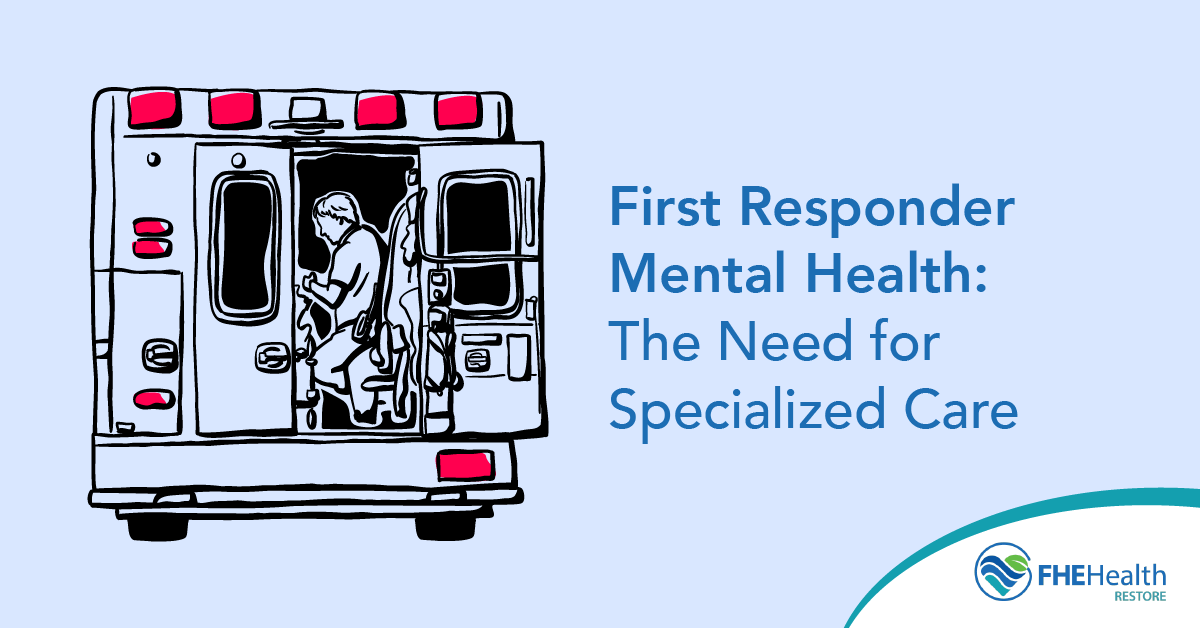First responders, including police, EMS workers and firefighters, experience mental health issues at higher rates than the general population. About 30% of first responders develop conditions such as post-traumatic stress disorder and depression, and many face an increased risk of suicide. Individuals working in these high-stress professions may also be at higher risk of substance use disorders. First responder therapy specifically addresses the challenges these professionals face and can help improve mental health in the face of trauma and intense stress.
Unique Stressors Faced by First Responders
Those who work in fields with frequent exposure to high-stress situations and potentially traumatic events face unique mental health challenges. Firefighters, police and EMS workers may encounter life-threatening conditions at any moment, and these jobs tend to be physically and mentally strenuous.
First responders have to deal with their own mental and emotional reactions, but they also regularly encounter members of the public who’ve just encountered major trauma. It’s the job of the first responder to provide a calm, helpful and authoritative presence for people currently under heavy emotional stress. Many first responders feel pressured to remain in control, which can lead them to avoid seeking help until mental health issues become impossible to ignore.
How Trauma and Burnout Affect Mental Health
Trauma and burnout are two major focus points for first responder therapy. Trauma can cause emotional dysregulation, a feeling of numbness and dampening of emotional reactions. Sometimes individuals who’ve been exposed to traumatic circumstances develop physical symptoms, such as headaches or nausea, or memory problems that aren’t immediately recognized as trauma-related. Trauma can also induce delusions, feelings of guilt, intrusive thoughts and other changes in cognition.
Burnout develops when first responders don’t have sufficient time to relax and recover between stressful or traumatic events. It’s the result of prolonged exposure to stress, not a single specific traumatic event. First responders experiencing burnout may feel exhausted or depleted, and burnout can lead to the development of serious mental health issues. Burnout also affects attitudes toward work, including increased negativity about the job and society as a whole. Over time, burnout can cause feelings of frustration, apathy or irritability.
Barriers to Seeking Help in First Responder Professions
One big challenge to seeking help as a first responder is a lack of access. Irregular working hours and the unpredictable nature of the job can leave first responders unable to schedule regular therapy sessions or commit to a long-term program of mental health care.
Stigmas against seeking help and internalized feelings of self-reliance also have an impact on whether a first responder seeks care for trauma, burnout or other mental health issues associated with the job. In some cases, first responders might worry about losing their jobs or being put on temporary leave if they admit a need for mental health care.
Specialized First Responder Therapy Programs
Therapy for first responders takes into account the unique stresses and job conditions associated with this type of work. It can include a variety of techniques specifically designed to reduce the effects of trauma. Each therapy program should be tailored to the individual since trauma exposure is unpredictable and coping mechanisms are personal.
Some evidence-based therapies used to treat mental health issues in first responders include:
- Cognitive behavioral therapy. During this type of therapy session, negative thought patterns are identified, and the therapist helps the individual develop coping mechanisms and techniques they can use when facing a new, potentially traumatic situation.
- Eye movement desensitization and reprocessing. During EMDR, eye movements are used to help rewire the neural connections involved with trauma.
- Stress management. Therapy aimed at stress management provides everyday tools and techniques to manage stress and prevent burnout.
- Exposure therapy. This form of therapy provides monitored, managed exposure to triggers that cause a stress response. Exposure therapy is often used after a traumatic event to desensitize the individual to things associated with that event.
- Family counseling. If job-related trauma is affecting a first responder’s home life, family counseling could help. During family counseling, close family members participate in therapy to improve relationships and learn how to support their loved one during stressful periods.
Finding a therapist who can deal with the unique needs of first responders involves seeking out professionals with experience in PTSD, depression and substance use disorders.
Benefits of Peer Support and Confidential Counseling
Peer support in a first-responder context is crucial for helping firefighters, EMS workers and police officers manage work-related stress and trauma. Sharing experiences and resilience strategies with others in the same profession helps first responders feel less isolated since everyone in the group has gone through similar struggles. Sharing coping techniques can help others in the group learn new strategies for dealing with work stress, and support groups make it easy for those having difficulty finding appropriate mental health assistance to access resources.
Confidential counseling is another essential part of first responder therapy. During counseling, intense emotions may arise, and knowing that the session is confidential makes it easier to share freely without fear of judgment or professional reprisals.
Building Resilience Through Preventive Care
Sometimes, preparing for mental health challenges can be an effective strategy for heading off severe trauma or burnout. Since first responders are at high risk of experiencing traumatic events and developing subsequent mental health issues, training these essential workers to deal with trauma is an essential part of preventive mental health care.
Some local municipalities or first responder organizations offer resilience training. This type of program provides information about trauma responses and gives these workers the tools to handle highly stressful situations without compromising their mental health. An effective preventive care program also includes screenings and ongoing therapy or peer group support meetings.
Restore Mental Health Can Help
If you’re in search of first responder therapy to help you manage the many mental health challenges of your work, contact Restore Mental Health today.



